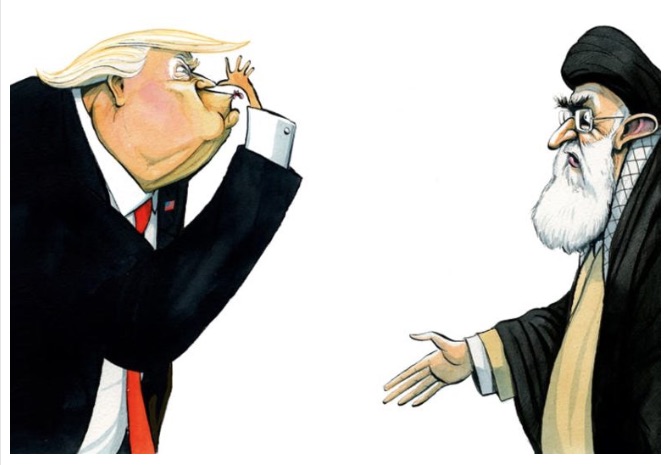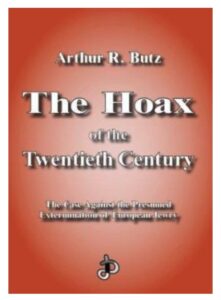Iran’s seizure of a British-owned oil tanker transiting the Persian Gulf has let loose a fresh round of media war chatter. Yet should another Persian Gulf War actually occur, who would benefit? Not America, that’s for sure.
The central theme of present-day American policy regarding Iran is deference. Nominally, US policy is made in Washington. Substantively, it is framed in Riyadh and Jerusalem, with the interests of the United States figuring only minimally in determining the result.
I am not suggesting that President Donald Trump supinely complies with secret marching orders from Saudi Crown Prince Mohammad bin Salman and Israeli Prime Minister Benjamin Netanyahu. Indeed, MBS and Netanyahu are both careful to uphold the pretense that the United States is the senior partner in their respective bilateral relationships. Yet it is manifestly the case that the United States today will undertake no action regarding Iran that Saudi and Israeli leaders find objectionable.
Trump’s predecessor was the exception who affirmed this rule. The Iran nuclear deal represented Barack Obama’s effort to reclaim a measure of autonomy in the formulation of US policy. Saudi Arabia and Israel fiercely objected to his initiative. Ever so briefly, Obama seemed to prevail. Yet his victory proved more apparent than real. Trump’s repudiation of that Joint Comprehensive Plan of Action (JCPOA) showed who the real victors were.
By most measures, the United States is the most powerful nation on the planet, certainly wielding more power than Iran or Saudi Arabia or Israel. Yet in this circumstance, power does not translate into freedom of action. As a practical matter, the policy options available to the United States in the Persian Gulf and more broadly in the Middle East are constrained by what Saudi and Israeli leaders are willing to tolerate.
This is by no means a recent development. Well before Trump, Washington had fallen into the habit of allowing Riyadh and Jerusalem each to exercise a de facto veto on matters that touched on what they conceived to be their own vital interests. As evidenced by US support for MBS’s senseless and unsuccessful war in Yemen and by the Trump administration’s effective abandonment of the two-state solution, that inclination remains firmly in place today. Put simply, with MBS and Netanyahu each classifying Iran as an existential threat, it has become incumbent upon Washington to do likewise.
We’ve seen this movie before, with Fidel Castro premiering the role currently assigned to the Ayatollah Khomeini. When Castro overthrew the corrupt but agreeably compliant regime of Fulgencio Batista in 1959, he transformed Cuba from an American protectorate and playground into a problem. Succumbing to perfervid Cold War anti-communism, the administrations of Dwight D. Eisenhower and John F. Kennedy insisted on treating revolutionary Cuba as a dire threat to the security of the United States and the entire western hemisphere. Nothing would suffice but to bring about regime change in Havana, ‘liberated’ Cuba thereby reverting to its de facto colonial status.
This impulse led in short order to the humiliating debacle at the Bay of Pigs, to reckless and unsuccessful CIA attempts to assassinate Castro, and finally to the Missile Crisis of October 1962. Staring into the abyss, JFK decided in the nick of time that the United States could after all tolerate the existence of the Castro regime. Cuba became and remained for decades thereafter a mere annoyance.
That Washington’s current obsession with Iran, mirroring its obsession with Cuba six decades ago, could result in miscalculation comparable with that which brought the planet to the brink of nuclear war in 1962 is not beyond the realm of possibility. I do not mean that Trump himself is consciously intent on overthrowing the Ayatollahs, although nothing would please the Saudi and Israeli governments more. The danger today is not rashness induced by ideology, but blunders caused by gross incompetence.
In assessing Trump’s approach to statecraft — I use the term ‘approach’ loosely since it implies a measure of coherence and consistency — it is essential to keep three things in mind. First, action seldom matches rhetoric. Trump talks big, but rarely follows through. No sooner are threats of ‘fire and fury’ unleashed than they are forgotten. Second, the President’s limited attention span and the ease with which he is distracted make figuring out what might happen next anyone’s guess. Policy initiatives announced with great fanfare result in a step forward followed by a step (maybe two) back, with any next steps lost in a flurry of tweets. Examples of this phenomenon are legion: Nato, trade with China, the termination of the Afghanistan War, the withdrawal of US troops from Syria, border security, and, indeed, Iran itself. Follow-through is not one of this president’s strengths.
Finally, it’s difficult to know who is really in charge. Trump’s management style — again, using the term loosely — allows plenty of room for freelancing by insubordinate subordinates.
So does the United States presently have an identifiable policy toward Iran? If so, it presumably centers on imposing ‘maximum pressure’ on Tehran, thereby forcing it to comply with ‘12 demands’ laid out by secretary of state Mike Pompeo in May last year. But this was an exercise in grandstanding rather than serious diplomacy. Submitting to Pompeo’s ultimatum would be tantamount to surrendering Iranian sovereignty. It won’t happen.
In effect, the Trump administration has surrendered the diplomatic initiative to Iran. After a period during which it stuck to the terms of the JCPOA despite America abrogating it, Tehran has now embarked upon a calculated campaign of provocative acts. The apparent purpose of these provocations is to persuade Europe that it makes more sense to end Iran’s economic isolation than to see it resume its inevitably destabilizing efforts to acquire nuclear weapons. Britain and the other European powers quite obviously don’t want war, something that cannot be said with any assurance of the Trump administration’s hawkish Bolton wing. For Tehran, aggravating Washington carries considerably greater risk than annoying London, with the British government more likely than the Americans to offer sanctions relief. That hawks in the Trump administration and in the American foreign policy establishment, egged on by the likes of MBS and Netanyahu, will use the restoration of an Iranian nuclear program as a pretext for war helps concentrate diplomatic minds in London, Paris and Berlin, not to mention Tokyo, Moscow and Beijing.
So the situation is a dangerous one. To repurpose the title of a bestselling American book from a few years back, the time to appreciate the art of the deal is at hand. Avoiding yet another war in the Persian Gulf will require negotiating arrangements that will satisfy the minimal requirements of all interested parties. Of course, the JCPOA did just that, as far as the world’s principal powers were concerned, Saudi Arabia, Israel, and hardcore American right-wingers alone dissenting.
Resuscitating or replacing the JCPOA presents enormous challenges, made greater still by the approach of the 2020 US presidential election. But for Trump the place to begin is to recall the lesson that John Kennedy learned back in 1962: to mistake an annoyance for an existential threat is to court disaster. Recognizing that Iran qualifies as the former rather than the latter is to take an important step toward enabling Washington to reassert control of US policy.
This article was originally published in The Spectatormagazine.




Best I can tell, we have allowed shills and trolls to dominate this conversation. That is pitiful.
Should I drop the hammer and take most of them out? I think we have to experiment with a moderated forum.
I have said yes all along….they’re just poisoning the well….I asked for a vote, but it didn’t go too far. I just see nothing positive that comes from allowing them here. If they are needed to keep the blog active, we’re in trouble, anyway.
It’s probably close to impossible to make a deal when other partties are calling the shots. By now, it’s obvious Trump has learned just that. Backing out of that nuclear deal was doubtful a move Trump would have made by himself. He said it was a bad deal, but never said WHY. Seems the ‘WHY’ was because it was settled and little if any provocation was present. But, we know who looking for provocation, do we not…AND we know who will be doing the fighting and it will not be the ‘little hats, eh?
((Put simply, with MBS and Netanyahu each classifying Iran as an existential threat, it has become incumbent upon Washington to do likewise.))
Anything ant-Zionist is a threat, is it not?
WHY?